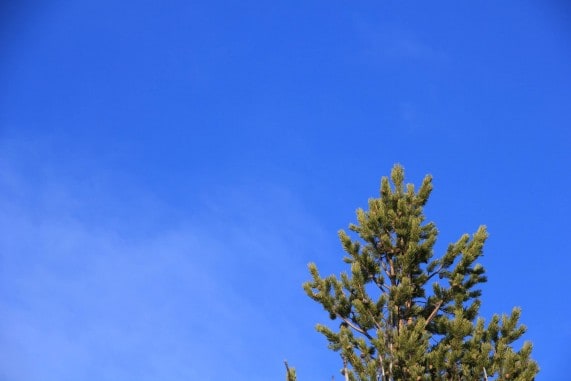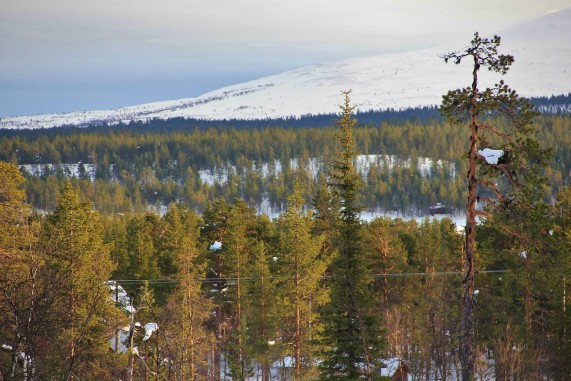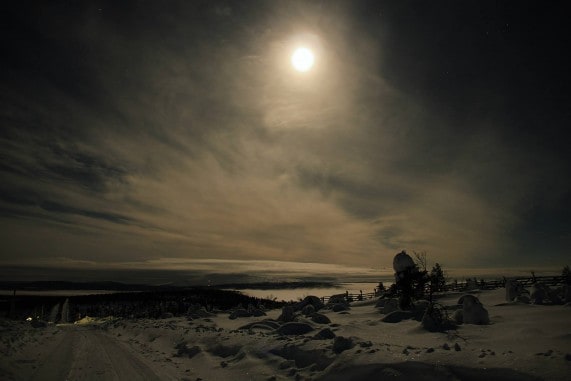Of course they had cloud in Finland. I just never once thought about it.
Even if I had, I doubt I’d’ve expected so much of it. It had blanketed the sky ever since we arrived, mocking the thousands of miles we’d traveled in search of the Aurora.
It was not until our fourth day that we finally journeyed far enough to escape. When the coach finally outran the cloud, it’s thick, grey seam marked a clear border between Finland and Sweden.
The crystal clear blue seemed to be of a more vibrant hue than when I last saw it in England. But even that blue was a creeping thief, eating into our chances. Every day, we lost a staggering seventeen minutes of night, as the wandering axis of the earth pitched us further toward the sun.

The Northern Lights were making me see everything differently.
Our excursion was to visit a Swedish museum. Our first crisp, clear day, and we were indoors for the first time all holiday. I love museums, but my mind was clouded as the distant Finnish sky by the fast-fading hope of an invitation to the celestial disco.
We shuffled quietly through heated exhibits that turned my thermals into a cloying film of nylon and sweat. It wasn’t long before we quietly excused ourselves.
Sarah found a path behind the museum that led uphill, so we followed it. It was a snowshoe track, but we ploughed through it without them, knee-deep in fresh snow, breathing fresh air and feeling fresh-faced. The Arctic Circle certainly had a purity about it.
We climbed until we could see the forest from the trees, carpeting the taller hills beyond. Breath-taking.
 It was already time to return to the hotel. Confined again to the cramped seats of the coach, we found ourselves traveling inexorably toward the grey blanket slumped over Finland.
It was already time to return to the hotel. Confined again to the cramped seats of the coach, we found ourselves traveling inexorably toward the grey blanket slumped over Finland.
As the skies darkened, so did my mood. I began to grumble. Our chances of seeing aurora borealis were fading with every kilometre we drew closer to the hotel.
My dissension did not go unnoticed, and soon the other passengers on the excursion were wondering the same things: Why can’t we just go to where the clear skies are? Why is this the furthest we’d been from the hotel? Why weren’t our guides leading us here at night?
I decided to do something about it. The bus hadn’t even drawn to a halt before I slid the door open and stalked to the front desk. I asked for the guide, keen to know the reason why our ‘hunt’ was always restricted to the tiny town the hotel was nestled above, instead of out there where we stood a chance.
She was out. Until dusk. By then it would certainly be too late to arrange anything.
As I went to find Sarah and share my plan to steal some snowmobiles, I found her nestled amid a cabal, conspiring in hushed tones beside the bus.
I reported our guide’s absence, but Sarah explained they were discussing taking matters into their own hands. Of course. Idiot. My obsession had again blinded me to the obvious.
In a stroke of dumb luck, the coach we took was the only one not owned by the hotel. It was an overspill van, owned by a Swedish family. The driver spoke no English, but through a series of creative mimes a member of our team managed to get the owner of the coach company on the phone. His wife spoke English, and soon we had a proposition.
If we could fill the coach, it would cost us just thirty Euros each to get back to the clear skies we came from, only this time at night. Of those on the coach that morning, only six wanted to join the night excursion. It made no sense to me, but it was their choice.
We dispersed in secret, agreeing to tell no-one; the guide would not be happy if she discovered our mutiny, and too many other guests would surely want to join us.
We had six remaining places to distribute, and we agreed to recruit two people.
Finally, we had a real shot.
Sarah kept a watchful eye on the solar activity forecasts as the day faded. We talked ourselves down, trying to keep a lid on our excitement. There was still no guarantee. The solar levels could be high, the skies clear, and we could still see nothing. What’s more, our coach rental only provided us a small, one-hour window in which to see the northern lights.
As night fell, the cloud over our village began to break for the first time. Patches of sky were visible above the hotel. The guide found me at dinner, anxious that I had been hunting her earlier in the day. With a little more smugness than I’d like to admit, I cheerfully explained it was a false alarm and went quickly into the dining hall.
I pulled aside a young couple and surreptitiously explained the plan. They were on board, and thrilled to be. I hurried back to our cabin to prepare.
The coach arrived, and we all tried to play down what we were doing. We kept the conversation banal, but our faces betrayed our secret.
The bus probably betrayed it more, but I’m creating an atmosphere here.
As soon as the door of the coach slid shut, that excitement burst out. The maiden voyage of the pirate Aurora Hunt began with a chorus of defiant cries.
As we retraced our route, Sarah monitored her countdown. On our first journey back, she noted it had been twenty minutes from the seam of the cloud to the hotel. If conditions had stayed the same, we could hope to see clear skies in the same amount of time.
Without the sun however, the mist had encroached, and twenty minutes later we found ourselves moving through thick swathes of fog that blocked our view of the stars.
The clouds were breaking up over the hotel when we left, yet they were thickening all around us. The coach quietened as anxiety set in. After all our efforts, we might be the only ones not to see them tonight.
One of our team had befriended a local Swedish man earlier in the day, and called him. Was it still cloudy over there? A little, he said, before suggesting we go to a place whose name I could not hope to pronounce, much less remember. We passed him to the bus driver.
As we arrived at the town with the museum, all was fog. It had a surreal quality to it, merging with the snow on the ground into a chilling white-out. Niflheim.
Suddenly, our bus pulled hard to the right, off the road and onto a snow track. Bold move. None of us knew why.
We started ascending. Gently, gradually, but consistently. The way steepened, and our hopes climbed with the coach. Sure enough, the fog began to thin, until finally we emerged at the summit of a hill that sat, island-like, above the sea of mist.
I stepped off the coach and was struck by the view. It was a beautiful sight in itself – the moon was full and bright enough that it felt like morning. It coloured everything with a pale sepia wash. We could see the glowing lights of the town below, but none of its detail. Farther off, I could see the rolling folds of the tree-covered hills we had climbed earlier that day.
Minutes before we arrived the solar activity levels had built from a 3 to a 4, making the moon our last remaining enemy- its light could bleach out any potential aurora sightings.
I turned my back on it, and walked behind the coach to relieve myself. My eyes widened, and I promptly forgot what I was doing and broke into a run, which promptly dumped me onto my face in hip-deep snow.
I looked up again. Was it?
“It’s there!” I cried, not waiting to find out.
If I wanted it enough, I could make it true.
The group excitedly ran around the coach, but whatever I’d seen was already fading. Perhaps it was a trick of the eye, and I’d been dazzled by the midnight moon.
I got my feet back underneath me and set up my tripod, taking a long exposure photograph out into the darkness. Forty seconds. Taking no chances.
Sure enough, it came back with the palest tinge of green. We’d found it.
What looked green to the camera looked like an indistinct grey smudge in the sky. The only reason it stood out was that it seemed to run perpendicular to the other smudges of cloud, and it seemed farther away.
Nevertheless, it was enough. I gave my bravest sentiments of feigned wonder, as did we all. It was real.
None of us had seen it with the naked eye, only ever in photographs. What was grey was green to my camera, so perhaps cameras had lied to us, greatly exaggerating the reality. It wouldn’t be the first time.
We stared intently at the smudge for what must have been ten minutes, but felt like an hour. Anti-climax loomed large, and our protestations of wonderment became thinner and harder to justify. We comforted ourselves that at least we’d seen something. We could tick the box, if nothing else.
We chatted amongst ourselves, and I decided to photograph the view. Focusing in this light proved near impossible.

We all started to realise how much colder it was up here, and several of our party retired to the bus for warmth.
Then Sarah gave a sudden and percussive, ‘ooh! Ooh!’
There were more grey smudges, and they seemed to be in line with the one we’d first seen. As we watched intently, they converged to form a small strip.
It intensified. I took another long exposure and sure it enough, it was green. It wasn’t long before that green was visible to the naked eye.
It was real. Really real.
Excited shouts were exchanged between those of us on the ground and those in the bus. Everybody poured out again. A grassy, pastel green luminescent fog shone out despite the moon.
The green strip extended to become a ribbon arcing across the sky, horizon to horizon. From here on the peak, we could see the full reach of the aurora. It seemed to waft and snake lazily as if held at each end, a string-and-can telephone line between the gods.
Then a second band began to bloom, shorter but thicker, more short lived, but more dramatic than the first, flaring into life and drawing more shouts of joy from we mortals on the ground.
It was then that things really started to move. More bands began forming, and for the first time we could perceive the height of these ribbons, which seemed to shoot their light up toward the stars. Where the sky was clear they took on a strange holographic quality, seeming inches away until you reached for them, then realised they soared miles above, far grander in scale. The ponderous shifting became more animated, and soon the ribbons were waving across the sky, flashing into and out of existence.
One band, that seemed to be on eye level, began to shimmer in such a way that the green was shot through with hair-thin lines of purple and silver, dancing along its length as the lights frilled and rippled from left to right across the sky. Unselfconscious, giddy cheers erupted, feeding the excitement.
The sky was now filled. Sarah and I stole grasping, child-like hugs of glee in between darting over each other’s shoulders to see the next shimmer. It was everywhere. It was alive. None of us had any doubt about that. Facts and truth have diverged, yet both fed into the wonder.
Our sun is pouring out energy into the universe. Those solar winds, full of charged particles, are pouring through our atmosphere. There, they bounce off nitrogen and oxygen and ionize, emitting light capable of feats unlike any other form of light we can witness.
And we can witness it. We have eyes capable of seeing it, minds capable of making sense of it, and memories capable of etching it into our very fabric.
I could see the stars, the planets, the moon, the edges of the earth and the northern lights. I understood something about all of them – I held knowledge that deepened and enriched my experience in the moment, and helped me appreciate it.
I felt infinitesimal. I understood in one moment what a phenomenon it was that consciousness exists, and what a cavalcade of phenomenae I was experiencing through it.
We call that awe. Eastern philosophies refer to it as oneness, or enlightenment. I’m as guilty as anyone of overusing the word awesome, but not until that moment did I truly understand its meaning.
It lasted perhaps ten minutes, but in that ten minutes the world had changed. As the bands began to settle and fade, the exhilaration did not.
The bus driver politely let us know it was time to leave, and all that remained in the sky was the same grey smudge that started it all. We passed around our cameras to see each other’s photographs, and someone even filmed our reactions – a clamour of joyous whoops and yells in a pitch black image.
When we returned to the hotel there were people waiting, and they had questions. Where had we gone? How had we done it? The breaks in the cloud there had revealed nothing. We were now the only ones who had seen aurora borealis.
The next night, everyone at the hotel got their first sighting. It was a gentle and more dispersed affair, but no less full of wonder. These exhibitions had unique personalities. By the time we left two days later, we had seen the lights four times.
Yet even now, an irrational part of me still believes if we hadn’t taken that coach trip, we would never have seen them.

